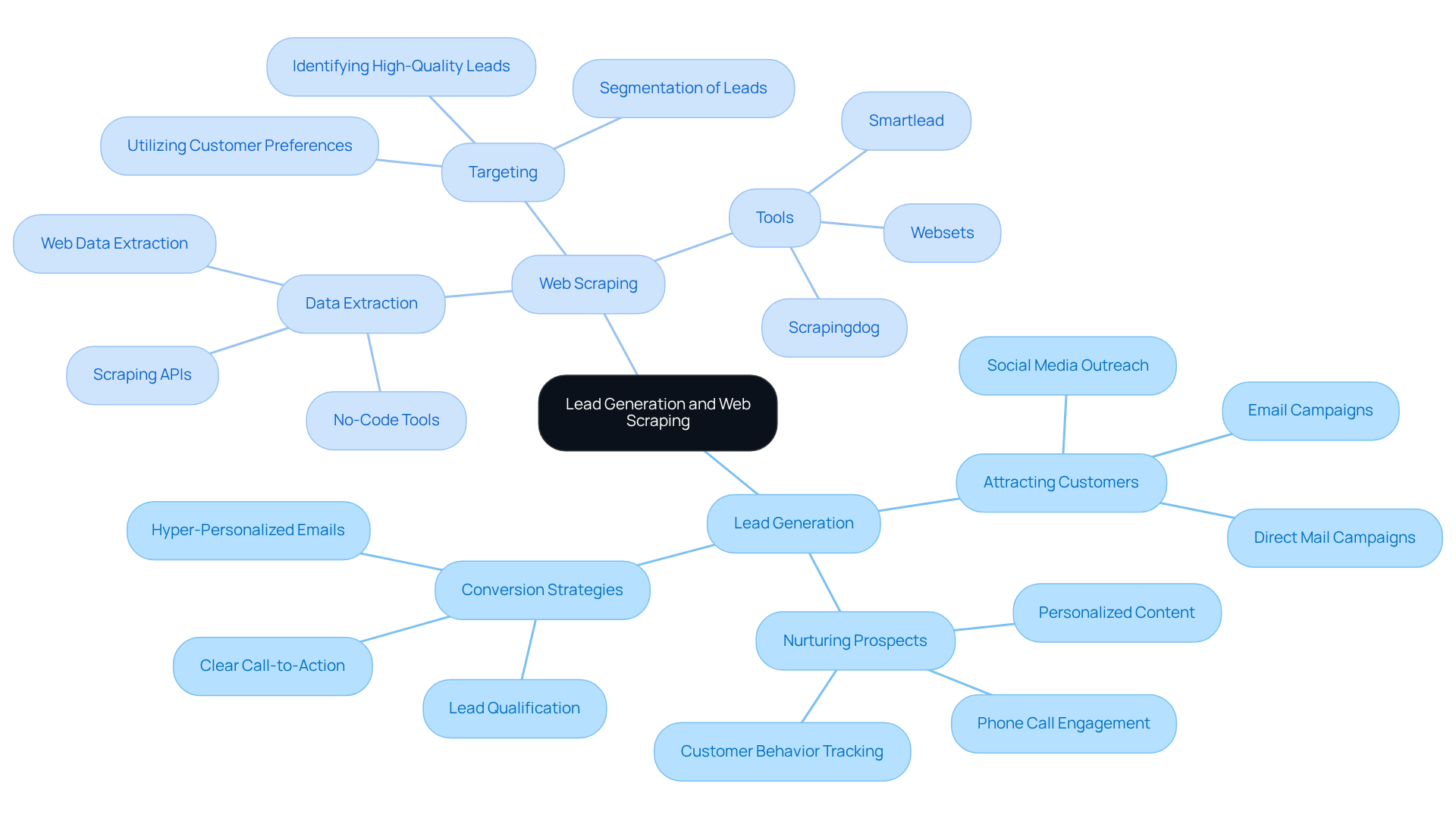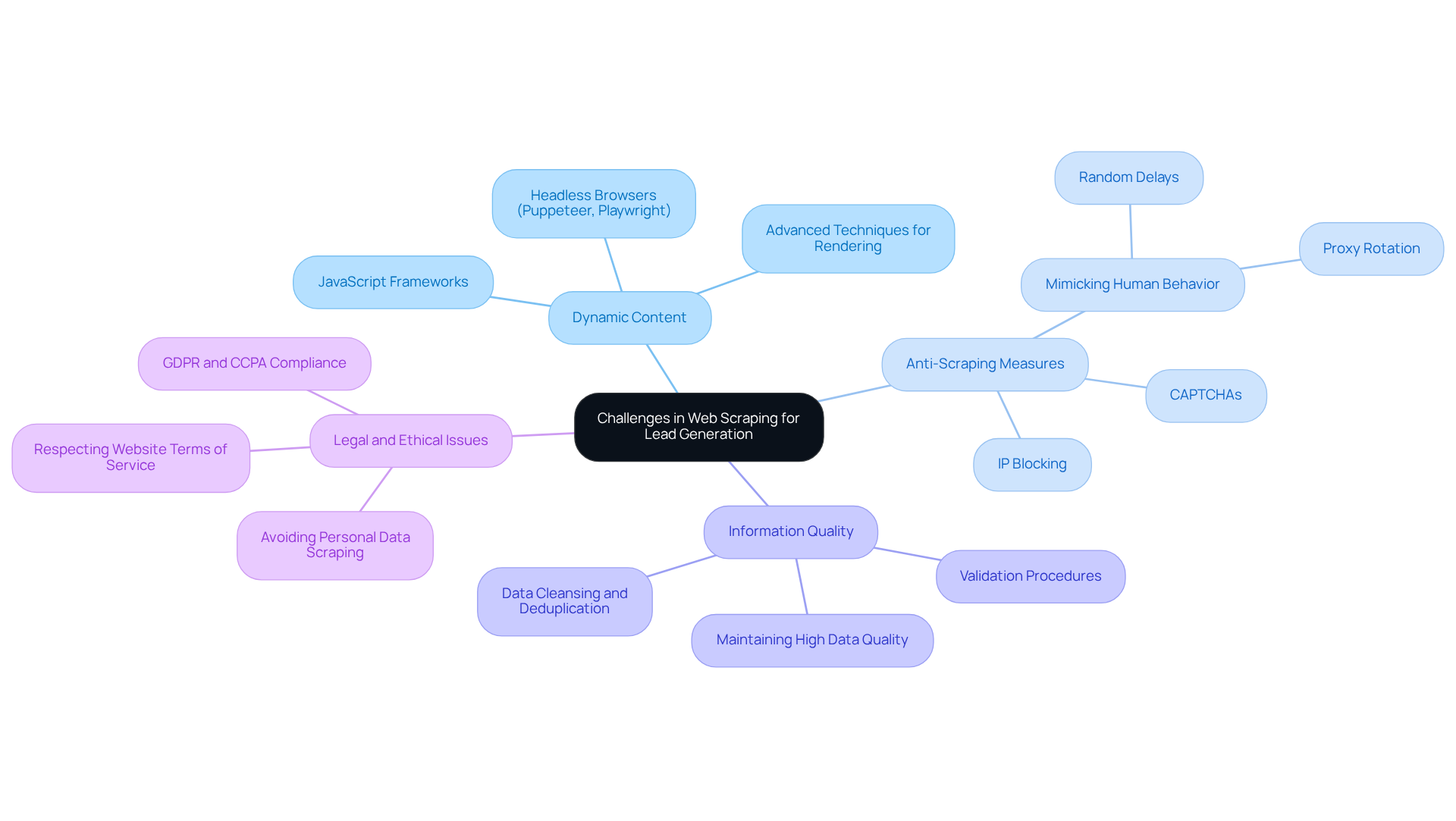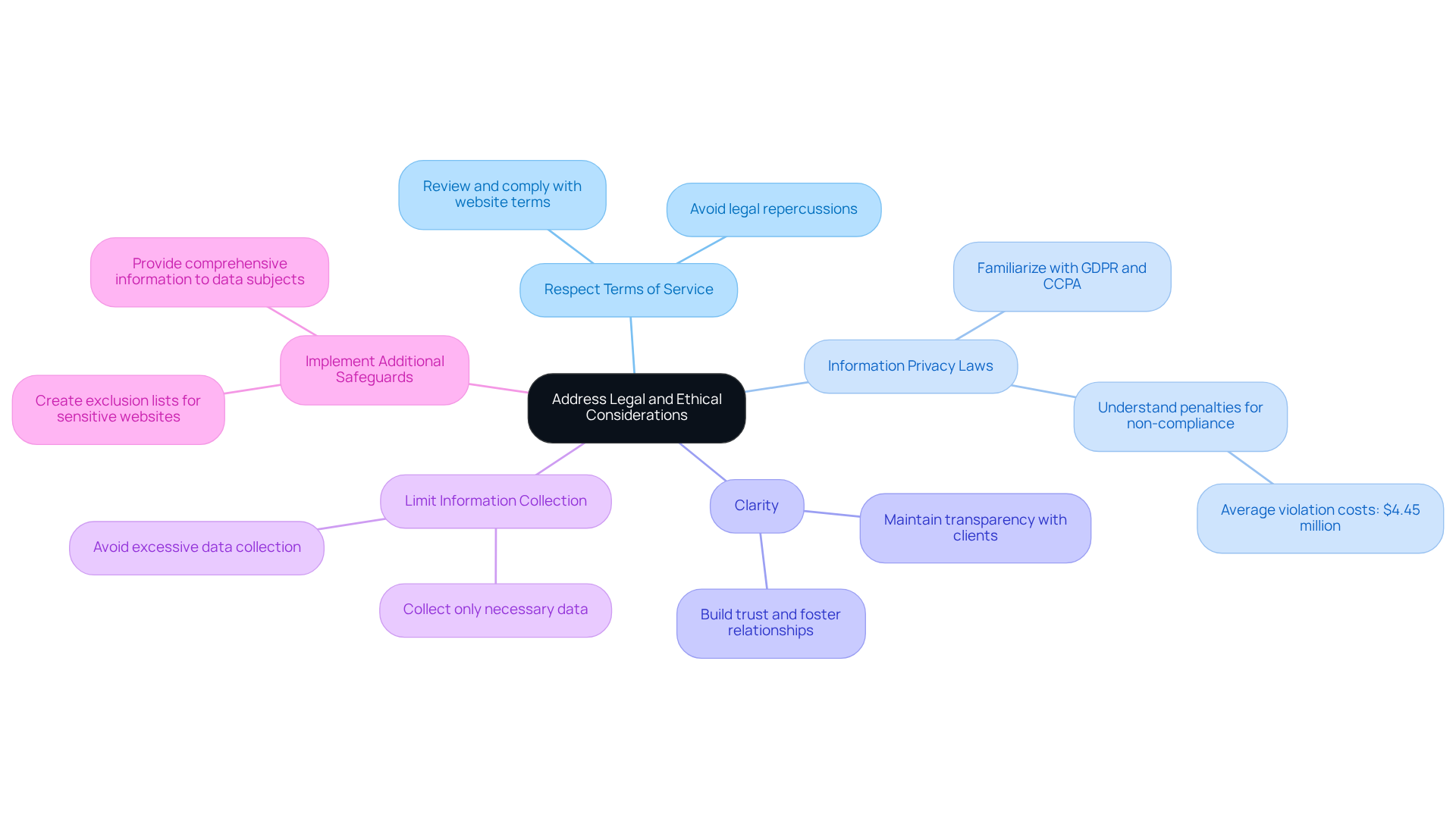Overview
Lead generation web scraping stands as a vital strategy for sales teams, automating the collection of potential customer data and significantly enhancing outreach and prospect acquisition efforts. By implementing best practices—such as utilizing reliable tools and adhering to legal and ethical guidelines—teams can dramatically improve the effectiveness of their scraping initiatives. This approach not only boosts efficiency but also mitigates risks associated with dynamic content, anti-scraping measures, and the quality of information gathered. Embracing these methodologies empowers sales professionals to navigate the complexities of modern data acquisition with confidence.
Introduction
Lead generation stands as the lifeblood of any sales team, propelling the pursuit of potential customers within an increasingly competitive marketplace. As businesses adopt innovative strategies, lead generation web scraping emerges as a formidable tool, automating the extraction of valuable data from websites to bolster prospecting efforts.
Yet, as teams embrace this technology, they encounter a myriad of challenges—navigating anti-scraping measures and ensuring compliance with legal standards.
How can sales teams effectively harness the potential of web scraping while overcoming these hurdles? This question is critical for those looking to advance their sales strategies.
Define Lead Generation and Web Scraping
Lead acquisition is an essential process that attracts and nurtures potential customers interested in a brand's offerings. This process encompasses various strategies designed to spark consumer interest, ultimately converting that interest into sales. A critical component of this process is lead generation web scraping, which is defined as the automated extraction of data from websites. By enabling sales teams to effectively collect vital information—such as contact details and company profiles—lead generation web scraping significantly enhances prospect acquisition efforts. This synergy empowers teams to leverage data-driven insights, allowing for precise targeting in their outreach.
Industry experts underscore the importance of web data extraction in prospect development. For instance, an experienced marketer has noted that efficient prospect development methods, including data extraction from websites, provide brands with a deeper understanding of customer preferences. This understanding facilitates personalized content, leading to increased conversion rates. Furthermore, businesses that employ web harvesting techniques have reported substantial improvements in their prospect acquisition success rates, emphasizing its positive impact on sales outcomes.
Current trends indicate a growing reliance on lead generation web scraping tools to refine prospect development strategies. As companies strive to enhance their outreach tactics, incorporating lead generation web scraping into prospecting frameworks has become essential. Websets' advanced offers unique capabilities for handling complex queries, ensuring that sales teams can concentrate on high-potential prospects. Additionally, Websets enhances candidate discovery and qualification through comprehensive searches for professionals. By adopting these innovative methods, organizations can significantly bolster their prospect acquisition capabilities and achieve superior sales results.

Identify Challenges in Web Scraping for Lead Generation
Lead generation web scraping presents several challenges that sales teams must navigate effectively. Leveraging Websets' AI-driven tools can help address these issues:
- Dynamic Content: Many websites utilize JavaScript frameworks like React, Angular, or Vue.js to load content dynamically, complicating traditional scraping methods. Overcoming these challenges requires advanced techniques, such as employing headless browsers like Puppeteer or Playwright, which can render pages fully, similar to regular browsers. Websets' tools can assist in this process by providing enhanced capabilities for capturing all pertinent information, especially as modern websites increasingly rely on dynamic content.
- Anti-Scraping Measures: Websites often utilize , such as CAPTCHAs and IP blocking, to prevent automated information extraction. In 2025, the prevalence of these measures is expected to rise, making it crucial for sales teams to adopt strategies that mimic human behavior. Websets offers solutions that can help automate these strategies, such as introducing random delays between requests and utilizing proxy rotation to avoid detection and maintain access.
- Information Quality: Ensuring the accuracy and relevance of collected information is paramount. Substandard information can result in unproductive prospecting and squandered resources. Establishing strong validation procedures and consistently improving extraction methods can assist in preserving high information quality. Websets offers tools that cleanse, validate, and deduplicate information, ensuring high quality, which is essential for effective lead generation web scraping efforts.
- Legal and Ethical Issues: The legal landscape surrounding web data extraction is complex, with varying regulations across jurisdictions. Sales teams must be aware of laws such as the GDPR and CCPA, which regulate collection practices. Ethical considerations also play a significant role; respecting website terms of service and avoiding the extraction of personal or sensitive data without consent is essential for maintaining compliance. Websets highlights the significance of ethical data collection practices, assisting teams in navigating these complexities.
By comprehending these obstacles and employing Websets' AI-powered tools, sales teams can formulate efficient strategies to reduce risks and improve their online data collection efforts. This ultimately results in more successful client acquisition outcomes.

Address Legal and Ethical Considerations
Engaging in lead generation web scraping demands unwavering adherence to legal and ethical guidelines. This commitment not only mitigates risks but also enhances your credibility in the marketplace.
- Respect Terms of Service: Always review and comply with the terms of service of the websites you scrape. Violating these terms can lead to , including lawsuits and IP bans.
- Information Privacy Laws: It is essential to familiarize yourself with privacy regulations such as GDPR and CCPA, which dictate the collection and utilization of personal information. Non-compliance can result in significant penalties, with violations averaging expenses of $4.45 million. This underscores the necessity of lawful and ethical information collection practices.
- Clarity: Maintain transparency with prospective clients regarding how their information is gathered and used. This approach builds trust and fosters positive relationships, which are crucial for long-term success.
- Limit Information Collection: Collect only the information necessary for your lead generation efforts. Excessive data collection can be perceived as intrusive and may violate ethical standards, leading to reputational damage.
- Implement Additional Safeguards: Consider the CNIL's recommendations, including creating exclusion lists for sensitive websites and providing comprehensive information to concerned individuals. These measures enhance transparency and protect the rights of those whose information may be collected through data extraction.
By prioritizing these legal and ethical considerations, sales teams can protect their organizations against potential risks while enhancing their lead generation web scraping efforts and bolstering their credibility. Successful businesses illustrate that compliance with GDPR and CCPA not only safeguards them legally but also strengthens client relationships and builds trust.

Implement Best Practices for Effective Web Scraping
To maximize the effectiveness of web scraping for lead generation, sales teams must adhere to best practices that drive results:
- Utilize Reliable Tools: Invest in reputable web data extraction tools capable of handling dynamic content and circumventing anti-extraction measures. Tools such as Scrapy, Octoparse, and Websets' API stand out, offering robust features for effective information extraction and rapid, precise web content retrieval tailored for AI-driven lead generation and recruitment.
- Implement Rate Limiting: To prevent overwhelming target websites and avoid IP bans, implementing rate limiting in your scraping processes is crucial. Websets provides , enabling sales teams to maintain a steady data flow without triggering security measures. Industry insights indicate that effective rate limiting can reduce the risk of being blocked by up to 70%. This practice not only ensures compliance with website policies but also enhances the effectiveness of your prospect acquisition efforts.
- Regularly Update Extraction Scripts: As websites frequently change their structure, it is essential to regularly update and test your extraction scripts. This proactive strategy preserves information precision and prevents interruptions in your prospect generation efforts.
- Information Validation: After scraping, verifying the information is essential to ensure accuracy and relevance. As specialists highlight, "Without prospects, there are no clients, and without clients, there’s no enterprise!" This can involve cross-referencing with other information sources or employing enrichment tools to enhance the quality of the contacts gathered. Utilizing Websets' tools can further streamline this process, ensuring that the prospects generated are of the highest quality.
- Monitor Legal Compliance: Staying informed about changes in legal regulations regarding web harvesting and privacy is crucial. Continuous monitoring ensures your practices remain compliant with laws such as GDPR and CCPA, safeguarding your organization from potential legal issues. Additionally, be aware of common pitfalls, such as over-scraping, which can result in IP blocking and legal complications. Websets is committed to security and compliance, offering SOC2 certification and enterprise data processing agreements to support your customer acquisition efforts.
By implementing these best practices, sales teams can significantly enhance their efforts in lead generation web scraping, ultimately driving better business outcomes.
![]()
Conclusion
Lead generation web scraping stands as a pivotal strategy for sales teams intent on optimizing their prospecting efforts. By automating the extraction of essential data from diverse online sources, organizations can markedly improve their capacity to identify and engage potential customers. This approach not only streamlines lead acquisition but also empowers teams to utilize data-driven insights for more precise outreach.
This article explores the multifaceted dimensions of lead generation web scraping, elucidating its definition, the challenges encountered, and the legal and ethical considerations that must be addressed. Key points underscore the necessity of employing advanced tools to navigate obstacles like dynamic content and anti-scraping measures, while ensuring adherence to relevant data protection laws. The examination of best practices further emphasizes the importance of maintaining high data quality and implementing robust strategies to mitigate legal risks.
Ultimately, adopting lead generation web scraping transcends mere sales enhancement; it signifies a dedication to ethical data practices and compliance with legal standards. Sales teams are urged to integrate these insights and best practices, ensuring their prospecting efforts are both effective and responsible. By doing so, organizations can foster trust with potential clients while achieving exceptional results in their lead generation initiatives.
Frequently Asked Questions
What is lead generation?
Lead generation is the process of attracting and nurturing potential customers who are interested in a brand's offerings, with the aim of converting that interest into sales.
What is lead generation web scraping?
Lead generation web scraping is the automated extraction of data from websites, allowing sales teams to collect vital information such as contact details and company profiles to enhance their prospect acquisition efforts.
How does lead generation web scraping benefit sales teams?
It significantly enhances prospect acquisition by enabling teams to leverage data-driven insights for precise targeting in their outreach, ultimately leading to improved sales outcomes.
What role does web data extraction play in prospect development?
Web data extraction provides brands with a deeper understanding of customer preferences, facilitating personalized content that can increase conversion rates.
What trends are observed in lead generation web scraping tools?
There is a growing reliance on lead generation web scraping tools to refine prospect development strategies, as companies aim to enhance their outreach tactics.
How does Websets contribute to lead generation web scraping?
Websets offers an advanced AI-powered search engine capable of handling complex queries, allowing sales teams to focus on high-potential prospects and improving candidate discovery and qualification.
What impact does web harvesting have on prospect acquisition success rates?
Businesses that employ web harvesting techniques have reported substantial improvements in their prospect acquisition success rates, highlighting its positive impact on sales outcomes.




